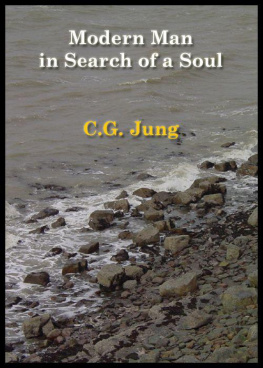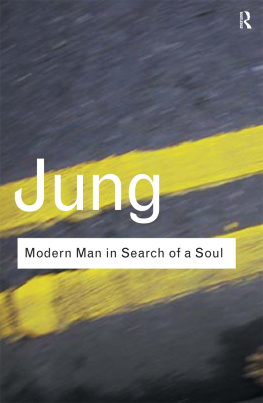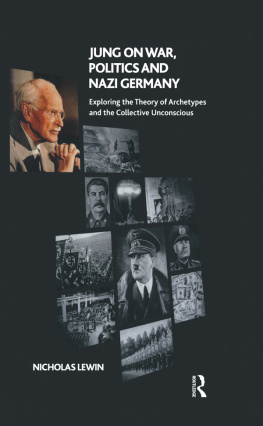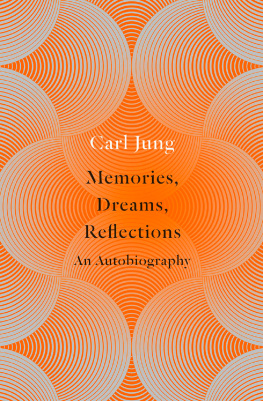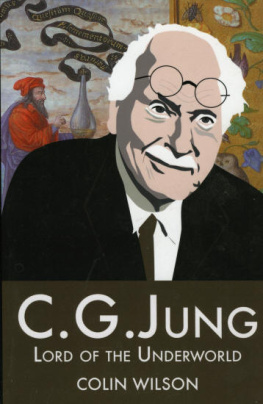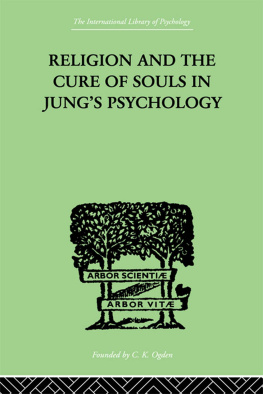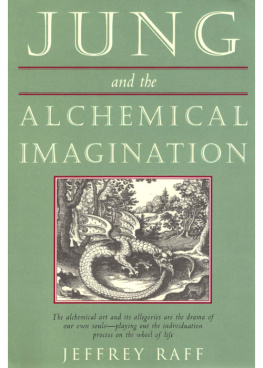Carl Gustav Jung - Modern Man in Search of a Soul
Here you can read online Carl Gustav Jung - Modern Man in Search of a Soul full text of the book (entire story) in english for free. Download pdf and epub, get meaning, cover and reviews about this ebook. year: 2011, publisher: Christopher Prince, genre: Religion. Description of the work, (preface) as well as reviews are available. Best literature library LitArk.com created for fans of good reading and offers a wide selection of genres:
Romance novel
Science fiction
Adventure
Detective
Science
History
Home and family
Prose
Art
Politics
Computer
Non-fiction
Religion
Business
Children
Humor
Choose a favorite category and find really read worthwhile books. Enjoy immersion in the world of imagination, feel the emotions of the characters or learn something new for yourself, make an fascinating discovery.
- Book:Modern Man in Search of a Soul
- Author:
- Publisher:Christopher Prince
- Genre:
- Year:2011
- Rating:3 / 5
- Favourites:Add to favourites
- Your mark:
- 60
- 1
- 2
- 3
- 4
- 5
Modern Man in Search of a Soul: summary, description and annotation
We offer to read an annotation, description, summary or preface (depends on what the author of the book "Modern Man in Search of a Soul" wrote himself). If you haven't found the necessary information about the book — write in the comments, we will try to find it.
Modern Man in Search of a Soul — read online for free the complete book (whole text) full work
Below is the text of the book, divided by pages. System saving the place of the last page read, allows you to conveniently read the book "Modern Man in Search of a Soul" online for free, without having to search again every time where you left off. Put a bookmark, and you can go to the page where you finished reading at any time.
Font size:
Interval:
Bookmark:
Modern Man in Search of a Soul
By Carl Gustav Jung
Translated by W. S. Dell and Cary F. Baynes
North American eBook Copyright 2011 Christopher Prince
CONTENTS
Within the last decade there have been many references from varied sources to the fact that the western world stands on the verge of a spiritual rebirth, that is, a fundamental change of attitude toward the values of life. After a long period of outward expansion, we are beginning to look within ourselves once more. There is very general agreement as to the phenomena surrounding this increasing shift of interest from facts as such to their meaning and value to us as individuals, but as soon as we begin to analyse the anticipations nursed by the various groups in our world with respect to the change that is to be hoped for, agreement is at an end and a sharp conflict of forces makes itself felt.
By those who uphold revealed religion, the rebirth that seems imminent is thought of as a renaissance of Catholicism or Protestantism, as the case may be. They see mankind streaming by the million back to the bosom of the Church, there to be comforted for the disillusionments and disasters of our post-war world, there to be taught the paths that will lead out of chaos. Renewal of faith in Christianity, they say, will bring us back to a sure way of life and restore the inspiration the world has lost.
Another great group of people think that the new attitude is to be attained by the total destruction of religion as it has up to now been understood. Religion is, they say, a relic of superstitious barbarism, and in its place must come a new and lasting period of "enlightenment." Let man but apply his knowledge in the right way, especially his knowledge of economics and technology, and all the great bogies of poverty, ignorance, greed, etc., will vanish into thin air and man will be restored to his lost paradise. To them the rebirth is to be in the realm of reason alone, and the intellect becomes the arbiter of man's fate.
Between these two extremes of traditional faith and militant rationalism, every conceivable shade of opinion about this great problem of humanity's next step in psychic evolution is to be found. It may be said that the middle position is held by those people who know that they have outgrown the Church as exemplified in Christianity, but who have not therefore been brought to deny the fact that a religious attitude to life is as essential to them as a belief in the authenticity of science. These people have experienced the soul as vividly as the body, the body as vividly as the soul. And the soul has manifested itself to them in ways not to be explained in terms either of traditional theology or of materialism. They do not wish to sever the real piety they feel within themselves from the body of scientific fact to which reason gives its sanction. They are convinced that if they can attain to more knowledge of the inner workings of their own minds, more information about the subtle but none the less perfectly definite laws that govern the psyche, they can achieve the new attitude that is demanded without having on the one hand to regress to what is but a thinly veiled medival theology, or on the other, to fall victims to the illusions of nineteenth century ideology.
It is to this last group of people that Jung speaks in convincing terms. He does not evade the difficult task of synthesizing his knowledge of the soul, gained in his many years of practice as psychiatrist and analyst, into a fund of information available and applicable to everyone. He gives those clues to the nature and functioning of the psyche for which the modern man is painfully groping. The point of view he lays before us is a challenge to the spirit, and evokes an active response in everyone who has felt within himself an urge to grow beyond his inheritance.
With one exception, all the essays which make up this volume have been delivered as lectures. The German texts of four of them have been brought out in separate publications and the others are to be found in a volume together with several other essays which have already appeared in English.
We are indebted to Mrs. Violet de Laszlo for many helpful suggestions in regard to the essay, Psychotherapists or the Clergy. Both Dr. Jung and Mrs. Jung have been kind enough to read and criticize the translations in part.
Cary F. Baynes
Zrich, March 1933.
The use of dream-analysis in psychotherapy is still a much debated question. Many practitioners find it indispensable in the treatment of neuroses, and ascribe as much importance to the psychic activity manifested in dreams as to consciousness itself. Others, on the contrary, dispute the value of dream-analysis, and regard dreams as a negligible by-product of the psyche.
Obviously, if a person holds the view that the unconscious plays a leading role in the formation of neuroses, he will attribute practical significance to dreams as direct expressions of the unconscious. If, on the other hand, he denies the unconscious or thinks that it has no part in the development of neuroses, he will minimize the importance of dream-analysis. It is regrettable that in this year of grace 1931, more than half a century since Carus formulated the concept of the unconscious, over a century since Kant spoke of the "immeasurable field of obscure ideas", and nearly two hundred years since Leibniz postulated an unconscious psychic activity, not to mention the achievements of Janet, Flournoy and Freudthat after all this, the actuality of the unconscious should still be a matter for controversy. Since it is my intention to deal exclusively with questions of practical treatment, I will not attempt in this place a defence of the hypothesis of the unconscious, though it is obvious enough that dream-analysis stands or falls with this hypothesis. Without it the dream appears to be merely a freak of nature, a meaningless conglomerate of memory-fragments left over from the happenings of the day. Were the dream nothing more than this, there would be no excuse for the present discussion. We must recognize the unconscious if we are to treat of dream-analysis at all, for we do not resort to it as a mere exercise of the wits, but as a method for uncovering hitherto unconscious psychic contents which are causally related to the neurosis and therefore of importance in its treatment. Anyone who deems this hypothesis unacceptable must simply rule out the question of the practicability of dream-analysis.
But since, according to our hypothesis, the unconscious plays a causal part in the neurosis, and since dreams are the direct expression of unconscious psychic activity, the attempt to analyse and interpret dreams is entirely justified from a scientific standpoint. Quite apart from therapeutic results, we may expect this line of endeavour to give us scientific insight into psychic causality. For the practitioner, however, scientific discoveries can at most be a gratifying by-product of his efforts in the field of therapy. He will not feel called upon to apply dream-analysis to his patients on the chance that it may throw light upon the problem of psychic causality. He may believe, of course, that the insight so gained is of therapeutic valuein which case he will regard dream-analysis as one of his professional duties. It is well known that the Freudian school is of the opinion that important therapeutic effects are achieved by throwing light upon the unconscious causal factorsthat is, by explaining them to the patient and thus making him conscious of the sources of his trouble.
If we assume, for the time being, that this expectation is borne out by the facts, we can restrict ourselves to the questions whether or not dream-analysis enables us to discover the unconscious causes of the neurosis, and whether it can do this unaided, or must be used in conjunction with other methods. The Freudian answer, I may assume, is common knowledge. My own experience confirms this view inasmuch as I have found that dreams not infrequently bring to light in an unmistakable way the unconscious contents that are causal factors in a neurosis. Most often it is the initial dreams that do thisI mean, those dreams that a patient reports at the very outset of a treatment. An illustration will perhaps be helpful.
Next pageFont size:
Interval:
Bookmark:
Similar books «Modern Man in Search of a Soul»
Look at similar books to Modern Man in Search of a Soul. We have selected literature similar in name and meaning in the hope of providing readers with more options to find new, interesting, not yet read works.
Discussion, reviews of the book Modern Man in Search of a Soul and just readers' own opinions. Leave your comments, write what you think about the work, its meaning or the main characters. Specify what exactly you liked and what you didn't like, and why you think so.

